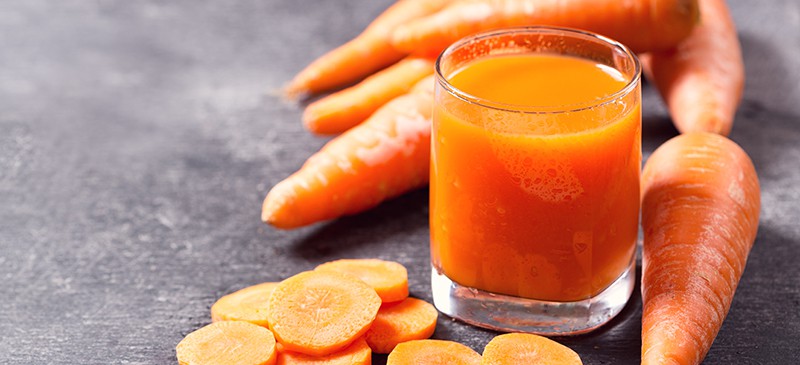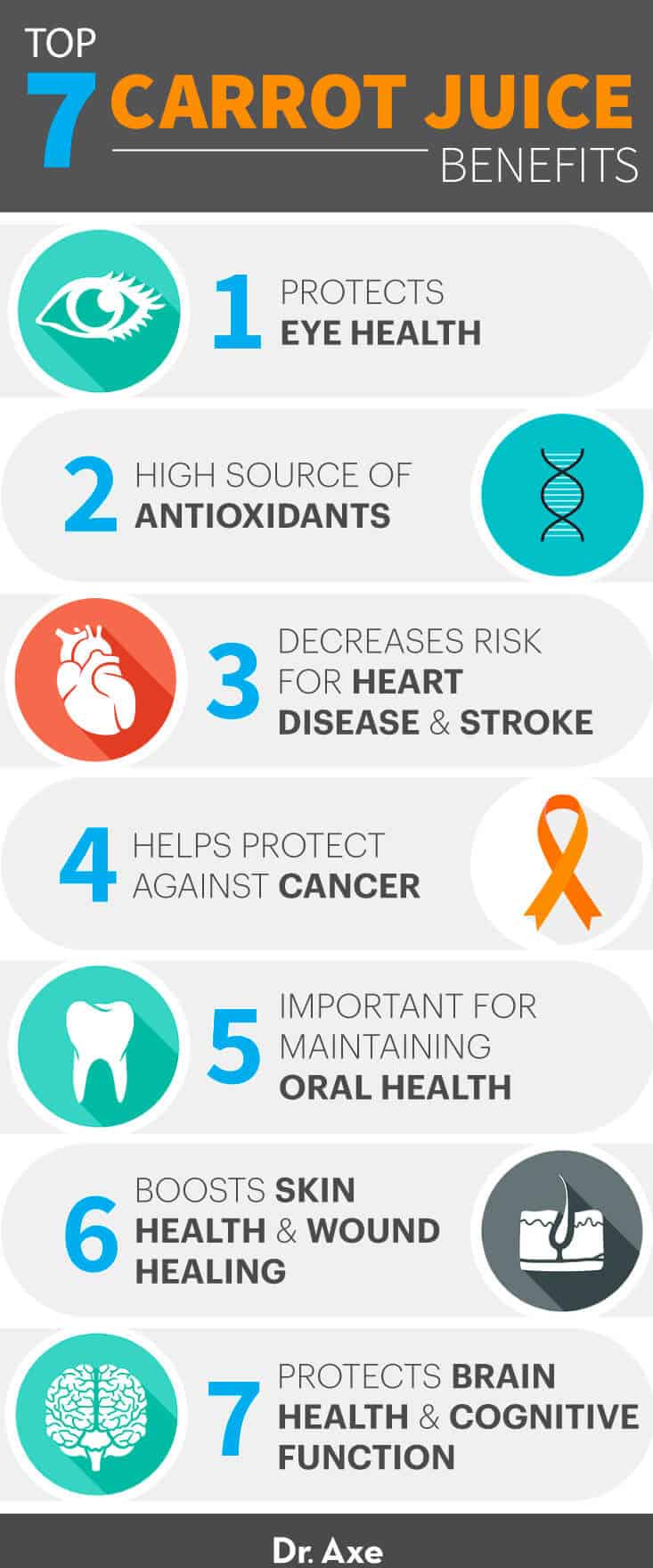Carrots are considered to be one of the most important cultivated vegetable crops in history and the most popular root vegetable worldwide. Whether they are eaten raw, cooked or as carrot juice, people from nearly every culture have consumed carrots — in their many forms — throughout history.
They get their orange color from antioxidants called carotenoids. One of these carotenoids is beta-carotene, a precursor to active vitamin A that is responsible for many of the carrot and carrot juice benefits that we know about today.
What are the benefits of eating carrots? Many studies have shown that beta-carotene is crucial for improving immunity in the body, protecting skin and eye health, and fighting free radical damage that can cause various forms of chronic diseases, such as cancer and heart disease.
They have a wealth of valuable nutrition, and when you juice them you get a concentrated dose of their healing power. Reducing cholesterol and triglycerides, relieving congestion and constipation, and protecting eyesight and skin health are some of the many benefits attributed to drinking carrot juice.
What Are Carrots?
Carrots (Daucus carota subsp. sativus) are a type of root vegetable — like the purple potato — in the Apiaceae plant family. They have been providing nutrients to populations for thousands of years, with records showing that the first modern-day carrot varieties were consumed around the 10th Century in parts of the Middle East and Central Asia.
Ad

Even before that time, many types of wild carrots (some sources say 80 different kinds) were eaten in countries like Persia, Turkey, Iran and areas in the Asia Minor.
Want to know a little known fact? Carrots are one of the highest contributors of vitamin A — the powerhouse vitamin for so much of our body — in the American diet. They also provide ample amounts of vitamins C, D, E and K, as well as many minerals ,such as magnesium, potassium and calcium.
They are also highly nutritious and cleansing due to their high fiber content. Studies show that carrot intake may enhance the immune system, protect against stroke, high blood pressure, osteoporosis, cataracts arthritis, heart diseases, bronchial asthma and urinary tract infections.
Types of Carrots
While known for their signature orange color, they actually come in a variety of colors. Yellow, white, red and purple carrots are now becoming available in more grocery stores and local farmers’ markets.
Today there are two main types of cultivated carrots: Eastern/Asiatic (which are often called anthocyanin carrots because of their purple roots) and Western (which are orange colored and are sometimes called carotene carrots).
Eastern varieties are usually found in Afghanistan, Russia, Iran and India, while Western types are found in Europe, North and South America. Both types belong to the species Daucus carota and offer similar health benefits.
Compared to carrots that were grown thousands of years ago, modern-day varieties are thought to be sweeter, more attractive in appearance, and better able to defend themselves from pests and bugs while growing.
When researchers tested levels of phenolic compounds in different types of carrots, they found that chlorogenic acid was the most predominant among 27 different types identified. Concentrations of vitamin C, alpha- and beta-carotenes, and certain flavor characteristics varied among the colored carrot varieties examined.
For example, purple types contained 2.2 and 2.3 times more alpha- and beta-carotenes than orange varieties.
Carrot Nutrition Facts
Carrots are some of the best vitamin A foods plus is an important high-fiber food.
A one-cup serving of chopped, raw carrots (about 128 grams) contains approximately:
- Calories: 52.5
- Total Carbohydrates: 12.3 g
- Fiber: 3.6 g
- Sugar: 6.1 g
- Total Fat: 0.3 g
- Saturated Fat: 0.04 g
- Polyunsaturated Fat: 0.1 g
- Monounsaturated Fat: 0.02 g
- Trans Fat: 0 g
- Protein: 1.2 g
- Sodium: 88.2 mg (4% DV)
- Vitamin A: 1,070 mcg (119% DV)
- Vitamin K: 16.9 mcg (14% DV)
- Vitamin B6: 0.2 mg (12% DV)
- Potassium: 410 mg (9% DV)
- Thiamine: 0.1 mg (8% DV)
- Niacin: 1.3 mg (8% DV)
*Daily Value: Percentages are based on a diet of 2,000 calories a day.
Some people avoid carrots because they believe they are high in sugar and will raise blood glucose. However, this advice isn’t supported by research.
One cup of raw carrots contains only about 10 grams of carbohydrate and almost four grams of fiber. The fiber in the vegetable helps slow down the release of sugars, in the form of glucose, into the bloodstream.
Including them in a healthy diet can even be safe for someone who has diabetes because they prevent any drastic increases in blood sugar. That being said, diabetics, or anyone else who may have trouble balancing blood sugar levels, should limit their consumption of carrot juice, as juicing carrots can concentrate the sugar in the vegetable because this process removes the protective fiber.
Ad

Carrot juice is a bit higher in carbohydrates than raw carrots, but also a more concentrated source of vitamin A, C, K, B6 and potassium.
A one-cup serving of carrot juice (approximately 236 grams) provides about:
- Calories: 94.4
- Total Carbohydrates: 21.9 g
- Fiber: 1.9 g
- Sugar: 9.2 g
- Total Fat: 0.4 g
- Saturated Fat: 0.1 g
- Polyunsaturated Fat: 0.2 g
- Monounsaturated Fat: 0.02 g
- Trans Fat: 0 g
- Protein: 2.2 g
- Sodium: 156 mg (7% DV)
- Vitamin A: 2,260 mcg (251% DV)
- Vitamin K: 36.6 mcg (31% DV)
- Vitamin B6: 0.5 mg (29% DV)
- Vitamin C: 20.1 mg (22% DV)
- Potassium: 689 mg (15% DV)
*Daily Value: Percentages are based on a diet of 2,000 calories a day.
Related: Ashitaba: A Traditional Leafy Green with an Impressive Nutrition Profile
Health Benefits
1. Protects Eye Health
Three crucial nutrients — beta carotene, lutein and zeaxanthin — within carrots considerably boost eye health by helping to maintain good eyesight and night vision. For example, without beta-carotene (a form of vitamin A), various forms of eye disorders can occur — including macular degeneration and even blindness.
Lutein and zeaxanthin, meanwhile, both work to reduce the risk of age-related vision loss.
Just one cup of chopped carrots provides over 100 percent of your vitamin A needs! They contain vitamin A in the form of beta-carotene.
Vitamin A is one of the most crucial nutrients necessary for protecting eye health and vision, especially as someone ages.
Vitamin A deficiency can lead first to night blindness, then permanent blindness. In fact, it is actually the No. 1 cause of preventable blindness worldwide.
Carrots can also reduce your risk of cataracts and macular degeneration, a common cause of age-related vision loss.
Eating them regularly will help you maintain healthy eyes and vision throughout your life. If consuming the vegetable in raw form does not appeal to you, bear in mind that drinking carrot juice carries over the same eye health benefits.
2. High Source of Antioxidants (Especially Carotenoids/Beta-Carotene)
Carotenoids, found in carrots and other orange vegetables, are potent antioxidants that can help reduce your risk of various forms of temporary illnesses and serious chronic diseases. Carrots and carrot juice benefit the immune system by helping to defend the body from free radical damage, harmful bacteria, viruses and inflammation.
The antioxidants that are responsible for the immune-enhancing effects include: vitamin C, beta-carotene, lycopene, lutein, zeaxanthin and polyphenols. Carrots are one of the highest natural sources of carotenoid phytochemicals and antioxidant beta-carotene, both of which studies suggest may help fight cancer by stopping DNA damage, levels of inflammation and cell mutation.
They also contain some succinic acid, α-ketoglutaric acid, lactic acid, glycolic acid and caffeic acid (the most predominant phenolic acid in most carrots).
3. Decreases Risk for Heart Disease and Stroke
Eating more deeply colored orange vegetables like carrots can help decrease the risk of cardiovascular disease. Regardless of other cardiovascular risks, research indicates that drinking carrot juice benefits heart health by lowering oxidative stress and improves the body’s defense against various forms of cardiovascular disease.
High plasma levels of alpha- and beta-carotene are also associated with a lower risk of atherosclerosis.
This effect is likely due to the high antioxidant and high fiber content that carrots contain. They work to lower cholesterol and boost bile production, which increases the body’s ability to digest fat.
They are a good source of both soluble and insoluble fiber. This not only helps your digestive system to properly absorb nutrition from your food, but also directly impacts the good cholesterol levels in your body.
Fiber can help to remove excess LDL cholesterol from the walls of arteries and blood vessels. Additionally, they provide potassium, which is beneficial for maintaining healthy blood pressure.
4. Helps Protect Against Cancer
Evidence suggests that consuming high levels of carotenoids from fruits and vegetables can be protective in relation to cancer recurrence. Studies show that these antioxidants in carrots may be able to fight leukemia cells and may play a role in reducing your risk of some of the most widespread types of cancers, including prostate cancer, ovarian cancer and breast cancer.
One study observed the effects of women with a history of breast cancer consuming eight ounces of fresh orange juice and carrot juice daily for a three-week period. These results showed that daily intake of fresh carrot juice benefited the body’s defenses against cancer and was an effective approach to increasing levels of protective antioxidant carotenoids in the blood, which reduce oxidative stress that can promote cancer growth.
A 2018 meta-analysis that investigated the association between dietary carrot intake and risk of breast cancer concluded, “Overall current literatures suggested that dietary carrot intake was associated with decreased risk of breast cancer.”
Other research also suggests that carrot benefits for men include the ability to decrease a man’s risk for prostate cancer. A number of studies also have shown that eating carrots may play a major role in the prevention of gastric cancer, the third leading cause of cancer-related mortality.
Additionally, carrot juice extract has been suggested as a potential treatment for leukaemia due to its “anti-cancer agents” including polyacetylenes (falcarinol, falcarindiol and falcarindiol-3-acetate) and carotenoids (beta-carotene and lutein).
5. Important for Maintaining Oral Health
The nutrients found in carrots help improve immunity, including the body’s ability to fight bacteria and toxins that enter through the mouth and live within the gums and teeth. Certain minerals in the vegetable can be antibacterial and help prevent cavities and tooth decay.
READ RELATED: The 2 Types of Plant-Based Milk That Folks Living in the Planet’s Longevity Hotspots Consume Most Often for Healthy Aging
They can also help remove plaque and stains from teeth if eaten after meals. Once eaten, the fiber also boosts immunity by acting as a natural “digestive system brush,” fighting constipation, scrubbing away unwanted bacteria in the gut, and promoting better digestion of immune-boosting nutrients.
6. Boosts Skin Health and Wound Healing
Carrot benefits for skin are due to the presence of compounds including beta-carotene, lutein and lycopene. Beta-carotene is critical for healing wounds, which is why carrots have even been used as a remedy to help heal wounds for centuries.
If you have any type of skin infection, cuts or other wounds, you’ll find that carrots and carrot juice benefits your skin health by increasing your ability to heal faster, fight infections and even reduce signs of skin inflammation.
7. Protects Brain Health and Cognitive Function
Benefits may also include boosting brain health by helping to prevent against Alzheimer’s disease, improving memory, and defending against other types of cognitive decline. This is due to carrot’s ability to lower oxidative stress in the brain that can weaken nerve signaling capacity.
Related: What Is Daikon Radish Good For? Nutrition, Benefits & Recipes
Organic vs. Conventional (Plus How to Grow)
It is best to consume whole, organic carrots if possible, which may be higher in antioxidants. Aside from buying the orange version, also look for multi-colored organic, heirloom varieties as they can be a very sweet and a delicious treat.
You do not need to peel them, as many of the nutrients and fiber are found in the skin. Just use a strong brush to wash the vegetable and remove any dirt and debris.
Ideally you should buy carrots that are grown organically whenever possible, especially when you are using them to make carrot juice. Root crops grow in the soil and are able to absorb whatever toxins and pesticides are present in the soil.
When you make carrot juice, you are consuming a high amount of this veggie at one time; this means that if toxins are present, you will also be ingesting a high level of these chemicals which can diminish the carrot juice benefits you’re looking for.
To get the most carrot and carrot juice benefits without consuming a high level of toxins, always try to buy organically grown versions.
How to Grow Carrots
- According to the Farmer’s Almanac, carrots can be grown in many climates. They are long-lasting plants and grow best during cooler months, in the spring or fall, and towards the ends of the growing season.
- They grow well in loose, light, airy soil, ideally soil that’s mixed with a bit of sand and peat moss. To help them grow, till down a foot and into the soil and remove any big clumps or rocks before planting seeds.
- Keep the soil moist with frequent shallow waterings. Plant carrot seeds 3 to 4 inches apart in rows. Let them get lots of light and only partial shade.
How to Eat and Juice
Carrots are consumed in multiple ways: raw, cooked, juiced, concentrated to make dried powder, canned, preserved, candied and pickled.
How long do carrots last? Fresh, whole varieties should last about 4 to 5 weeks in the fridge, while baby carrots last for about 3 to 4 weeks.
If you want to include more in your diet, there are a variety of ways to do so:
Raw
Is it good to eat raw carrots? Yes, the fiber content may be higher in raw varieties since it is not broken down through cooking.
Raw carrots can be a great snack, so pack a few in a plastic bag to take with you to work. Certain studies have even found that compared with meals that don’t include carrot nutrients, meals with whole carrots and/or blended versions result in significantly higher satiety and reduced hunger.
Is baby carrots nutrition the same as bigger types?
Baby carrots tend to be peeled and preserved, which means they may be a bit lower in certain nutrients compared to fresh varieties. They are usually washed in chlorine before packaging, therefore they should not be your first choice when it comes to carrots.
Instead try eating carrots whole instead, or juicing them. While they are convenient and kid-friendly, if possible consider cutting and peeling your own to retain the most vitamins.
Cooked
Eating cooked varieties in addition to raw types used in carrot juice is also important, as some research has found that cooked may have higher antioxidant activity than raw.
Balance carrot juice out with other vegetable juices that are lower in carbohydrates. Add carrots to soups, stews, or just lightly cook them in coconut oil for a delicious side dish.
Juiced
Is it better to drink carrot juice or eat carrots? A juice cleanse great way to include them in your diet, but don’t overdo it as juicing the vegetable removes the fiber and can increase the sugar content.
What are benefits of drinking carrot juice? One of the biggest reasons people avoid eating a high amount of vegetables is that they are short on time.
If you don’t have much time to cook and don’t always have the ability to prepare a fresh salad or another recipe using carrots, fresh carrot juice can be a great option for obtaining nutrients like vitamin A, C K and potassium.
What is the best time to drink carrot juice? You can have some whenever you prefer and is convenient, which for most people in in the morning.
Some people prefer drinking juice before breakfast on an empty stomach, but this is really a matter of preference.
The All About Juicing website recommends that you drink your juice at least an hour before or after your coffee, as the acidity of the coffee may cancel out some of the juice’s alkalizing effects.
How often should you drink carrot juice? Most health authorities, such as Harvard School of Public Health, recommend limiting your juice intake to 4 to 8 ounces of 100 percent juice (no sugar added) per day.
Carrot Juice Benefits
1. Concentrated Nutrition
Juicing fruits and vegetables to get the most live enzymes and all the concentrated nutritional benefits has become more popular over recent years, and juicing carrots is no exception. As people have learned more about carrot juice benefits, carrots have become one of the most loved additions to any homemade juice.
2. Health Benefits
Carrot juice benefits your overall health when you consume it regularly because it can add many life-enhancing micronutrients to your diet easily, in a fast and more efficient way.
Regularly drinking vegetable carrot juice benefits immunity, energy levels and digestion. It may also be able to help with weight loss due to resolving underlying nutrient deficient that may lead someone to overeat, as their body searches for more micronutrients.
When should you drink carrot juice for weight loss? Try having a small serving before breakfast or lunch, which may help take the edge off your hunger.
3. Eases Digestion
Juicing carrots and other vegetables can also help the digestive tract to absorb nutrients more easily, since the vegetable’s fibers are already broken down and less work needs to be done by the body to unleash vitamins and minerals.
This is important considering the fact that many people have compromised digestive abilities and digestive disorders like irritable bowel syndrome (IBS), due to years eating a poor diet that stresses the digestive system.
Most high-quality juicers break down vegetables to the point that their nutrients are somewhat “pre-digested.” This means that once the nutrients enter your stomach, they are absorbed into the bloodstream quickly and with less stress put on your stomach, intestines, liver and other digestive organs.
Recipes
Ready to cook with carrots at home? Try these healthy sweet and savory carrot recipes:
Carrot Juice Recipes
You can either make carrot juice in a high speed blender or in a juicer. Using about three large carrots will result in about 8 oz. of carrot juice, which is about 1 serving.
- Wash your carrots and peel them if you’d like to (although this isn’t necessary and the skin actually does contain important nutrients). You can also just cut away any dirt bits on the skin if you’d like.
- Cut them into smaller pieces, about 2–3 inches long, which makes them more manageable for a blender or juicer.
- If you’re using a blender, place all ingredients in the blender and blend until smooth, adding a splash of water or fresh squeezed orange or apple juice if needed to get the blender moving.
- Then, place a fine mesh strainer over a large bowl and pour the juice over, straining any fibrous bits. This won’t be necessary if you use a juicer.
- Discard the strained pulp and pour your juice into a serving glass. Or you can keep the strained pulp and mix it in to muffins or bread for added nutrition!
- You can always add more cold water, since the amount of juice you have will be relatively small. Serve cold ideally right away.
To add even more flavor to carrot juice, try combining it with other ingredients that enhance the taste.
Can you mix orange and carrot juice? You certainly can.
For example, this Orange Carrot Ginger Juice recipe features other nutrient dense foods that further help the body boost immunity and improve energy.
Want an easy carrot juice recipe for weight loss? Try this basic juice recipe or having a combination of carrot and celery juice that help fight stomach bloating.
Risks, Side Effects and Interactions
While eating carrots daily is perfectly fine and healthy for most people, eating large amounts can actually turn your skin orange, a medical condition known as carotenemia.
This occurs due to consumption of lots of beta-carotene, the chemical that gives orange veggies like sweet potatoes, pumpkins and carrots their color. Consuming lots of carotene can cause some to be stored under your skin, which can give your skin a tint of orange, especially your face, hands and feet, although it’s otherwise pretty much harmless.
Is it safe to drink carrot juice every day, or can too much carrot juice be harmful? The same risk is involved in drinking lots of carrot juice as eating lots of raw carrots; overdoing it can cause carotenemia, plus it may provide more sugar than you realize.
A “healthy” amount of beta-carotene is considered to be between six to eight milligrams a day, although up to 20 milligrams per day seems to be safe for most people. This is equivalent to the amount found in about three large carrots or three small glasses of carrot juice. So to be safe, stick to 1–2 servings daily.
Can you die from drinking too much carrot juice? It’s extremely unlikely, although not impossible, since having too much of basically any food can potentially be dangerous of deadly, such as for people with allergies.
Excessive amounts of vitamin A can be toxic, but you would need to consume pounds of carrots daily or more than a gallon of carrot juice for this to be a serious issue.
Final Thoughts
- Carrots (Daucus carota subsp. sativus) are a type of root vegetable in the Apiaceae plant family.
- There are few calories in carrots, yet lots of vitamins, minerals and antioxidants. The most concentrated carrot vitamins include vitamin A, C, K, and B6 as well as potassium and antioxidants like lutein, zeaxanthin, and lycopene.
- Benefits include: lowering oxidative stress and inflammation; supporting eye and skin health; defending against cancer and heart disease; protecting the brain; supporting oral/dental health; and more.
- If you don’t have much time to cook and don’t always have the ability to prepare a fresh salad or another recipe using carrots, fresh carrot juice can be a great option. Can you drink carrot juice every day? Yes, aim for 4 to 8 ounces daily of 100 percent fresh carrot juice at any time that is convenient.
!function(f,b,e,v,n,t,s)
{if(f.fbq)return;n=f.fbq=function(){n.callMethod?
n.callMethod.apply(n,arguments):n.queue.push(arguments)};
if(!f._fbq)f._fbq=n;n.push=n;n.loaded=!0;n.version=’2.0′;
n.queue=[];t=b.createElement(e);t.async=!0;
t.src=v;s=b.getElementsByTagName(e)[0];
s.parentNode.insertBefore(t,s)}(window, document,’script’,
‘
fbq(‘init’, ‘3475171552810057’);
fbq(‘track’, ‘PageView’);






